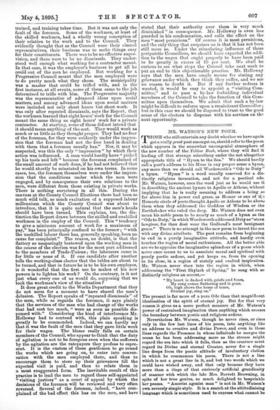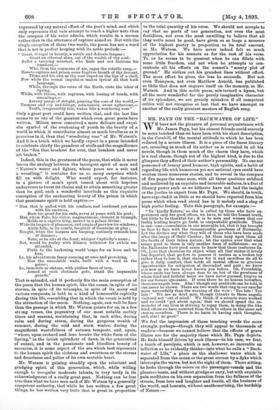MR. WATSON'S NEW POEM.
THOSE who still entertain any doubt whether we have again got a really great poet amongst us, should refer to the poem which appears in the somewhat uncongenial atmosphere of the new number of the Yellow Book, where they will find it leading off that strange miscellany under the not altogether
appropriate title of "Hymn to the Sea." We should hardly call a poet's address to his Muse in any proper sense a hymn, any more than we should call Wordsworth's "Ode to Duty" a hymn. " Hymn " is a word usually reserved for a dis- tinctly religions invocation, and not for a poetical ode.
Mr. Watson, however, uses the word just as he would use it in describing the ancient hymns to Apollo or Athene, without
implying that he is really meaning to address a being as far above him in power and grace, as Homer or one of tte Homeric circle of poets thought Apollo or Athene to be ahoy.) them when they addressed the Goddess of Wisdom or the Earthshaker who ruled the deep. Mr. Watson does not even mean his noble poem to be nearly as much of a hymn as the
"Ode to Duty," in which Wordsworth addressed Duty as "stern lawgiver, for thou dost wear the Godhead's most benignant grace." There is no attempt in the new poem to invest the sea with any divine attribute. The poet remains from beginning to end in a purely imaginative attitude, and hardly even touches the region of moral enthusiasm. All the better able are we to appraise the imaginative splendour of a poem which never once seems to us to associate moral and spiritual with purely poetic ardour, and yet keeps us, from its opening to its close, in a region of stately and exalted inspiration. Mr. Watson never rises into the region in which, when addressing the "First Skylark of Spring," he sang with so distinctly religious an accent,—
" My heart is dashed with griefs and fears, My song comes fluttering and is gone. Oh, high above the home of tears, Eternal joy, sing on."
The present is far more of a pure Ode than that magnificent idealisation of the spirit of eternal joy. But for that very reason it gives us a more perfect measure of Mr. Watson's power of restrained imagination than anything which crosses the boundary between poetic and religions ardour.
Nevertheless Mr. Watson, though he never rises, or rises only in the few last lines of his poem, into anything like an address to creative and divine Power, and even in those lines regards the Presence in whose infinitude he merges the ocean he has been addressing more as the stream might regard the sea into which it falls, than as the creature must
regard its Divine and eternal Creator, never for a single line drops from the poetic altitude of involuntary elation in which he commences his poem. There is not a line which is not a great line in it, and but two words which we could have wished away, and that only because they have more than a tinge of that curiously artificial grandiosity
of manner with which the late Mrs. Barrett Browning, in spite of her true genius, so much delighted to besprinkle her poems. "Amorist agonist man" is not in Mr. Watson's own severely simple style. It is a snatch at the attitudinising language which is sometimes used to express what cannot be
expressed by any natural effort of the poet's mind, and which only represents that vain attempt to reach a higher note than the compass of his voice admits, which results in a scream rather than in the utterance of rapture aimed at. Bat with the single exception of these two words, the poem has not a word that is not in perfect keeping with its noble prelude :—
"Grant, 0 regal in bounty, a subtle and delicate largess ; Grant an ethereal alms, out of the wealth of thy soul : Suffer a tarrying minstrel, who finds and not fashions his numbers,—
Who, from the commune of air, cages the volatile song,— Here to capture and prison some fugitive breath of thy descant, Thine and his own as thy roar lisped on the lips of a shell, Now while the vernal impulsian makes lyrical all that bath language, While, through the veins of the Earth, riots the ichor of Spring, While, with throes, with raptures, with loosing of bonds, with unsealings,— Arrowy pangs of delight, piercing the core of the world,— Tremors and coy unfolding,s, reluctances, sweet agitations,— Youth, irrepressibly fair, wakes like a wondering rose."
Only a great poet could have written that, and the last line seems to us one of the greatest which even great poets have written. Milton never conceived a more delicate and exqui- site symbol of the awakening of youth to the beauty of a world to which it contributes almost as much loveliness as it perceives in it, than that "wondering rose" of Mr. Watson's. And it is a touch which we hardly expect in a poem intended to celebrate chiefly the grandeur of strife and the magnificence of the "Sea that breakest for ever, that breakest and never art broken."
Indeed, this is the greatness of the poem, that while it never leaves the analogy between the insurgent spirit of man and "Nature's wooer and fighter, whose years are a suit and a wrestling," it contains for us so many surprises which fill us with delight. Who would expect, for instance, in a picture of man's spirit tossed about with hopeless endeavours to burst its chains and to attain something greater than its goal, such a wonderful interlude as this exquisite conception of the enchanting beauty of the prison in which that passionate spirit is held captive :—
" Man that is galled with his confines, and burdened yet more with his vastness,
Born too great for his ends, never at peace with his goal; Man whom Fate, his victor, magnanimous, clement in triumph, Holds as a captive king, mewed in a palace divine : Wide its leagues of pleasance, and ample of purview its windows ; Airily falls, in its courts, laughter of fountains at play ; Nought, when the harpers are harping, untimely reminds him of durance ; None, as he sits at the feast, whisper Captivity's name ; But, would he parley with Silence, withdraw for awhile un- attended, Forth to the beckoning world 'scape for an hour and be free, Lo, his adventurous fancy coercing at once and provoking, Rise the unscalable walls, built with a word at the prime ; Lo, immobile as statues, with pitiless faces of iron, Armed at each obstinate gate, stand the impassable guards."
That is splendid, and it perfectly fits the main conception of the poem that the human spirit., like the ocean, in spite of its storms, in spite of its triumphs, in spite of its many and various conquests, is held in a kind of honourable captivity during this life, resembling that in which the ocean is held by the attraction of the moon. Nothing, again, can well be finer than the passage in which Mr. Watson paints for us, in a few strong verses, the pageantry of our most notable earthly times and seasons, maintaining that, in each alike, during calm and during storm, during the gorgeous wealth of summer, daring the cold and stern winter, during the magnificent wastefulness of autumn tempests, and, again, "where, upon orchard and lane breaks the white foam of the Spring," in the lavish splendour of dawn, in the generosities of sunset, and in the passionate and bloodless beauty of moonrise, it is some aspect of the sea which best represents to the human spirit the richness and sweetness or the storms and dreariness and pallor of its own mutable heart.
Mr. Watson is gaining steadily upon the reluctant and grudging spirit of this generation, which, while willing enough to recognise moderate talents, is very tardy in its acknowledgment of a really great poet. Nothing can be less true than what we have seen said of Mr. Watson by a generally competent authority, that while he has written a few great things, he has written very little that is great in proportion to the total quantity of his verse. We should not scruple to say that no poets of our generation, not even the most fastidious, not even the most unwilling to believe that all they write must be good, have given us so large a measure of the highest poetry in proportion to its total amount, as Mr. Watson. We have never indeed felt so much appreciation for his sonnets as for the rest of his verse. To us he seems to be greatest when he can dilate with some little freedom, and not when he attempts to con- centrate all his efforts on the sonnet's "scanty plot of ground." He strikes out his grandest lines without effort. The more effort be gives, the less he succeeds. But not even Tennyson, not even Matthew Arnold, has published so little that does not engrave itself on the memory, as Mr. Watson. And in this noble poem, mis-termed a hymn, but all the more wonderful for the purely imaginative character of its splendour, we are greatly mistaken if all competent critics will not recognise at last that we have amongst us another of the really greatest masters of English song.







































 Previous page
Previous page